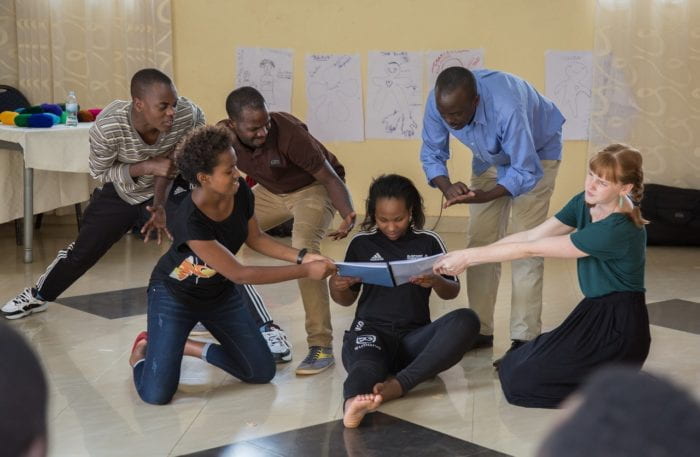Latest posts
- Policy documents: UNICEF Innocenti Discussion Paper on Children and Youth Participation (August 2025) 26 August 2025
- MAP International Online Conference 2025: Session Summaries Report 24 July 2025
- MAP 2025 Conference Highlights: Recordings and Slides 23 July 2025
- Journal article: Reimagining Peace Education in Nepal: Arts-Based, Learner-Centric Pedagogy for Social Justice and Equity 13 July 2025
- Curricula: Mithila art-focused local curriculum in Nepal 2 July 2025
- MAP International Online Conference 2025 1 June 2025
- Policy brief: Gira Ingoma book and policy brief: “The Culture We Want, for the Woman We Want” 28 November 2024
- Manuals and toolkits: GENPEACE Children’s Participation Module in the Development Process 13 November 2024
- Journal article: [Working Paper] Gira Ingoma – One Drum per Girl: The culture we want for the woman we want 30 October 2024
- Curricula: Beyond Tradition: Psychosocial Model 30 October 2024
- Curricula: Beyond Tradition Module: Revitalizing Lenong as a Model for Teaching Betawi Arts 30 October 2024
- Curricula: Beyond Tradition: Lenong Revitalisation as a Model for Teaching Betawi Cultural Arts 30 October 2024
Mobile Arts for Peace: March 2019 Update
23rd March 2020
This post is a rework of the March 2019 MAP newsletter.
This post is a re-post of the MAP newsletter of March 2019.
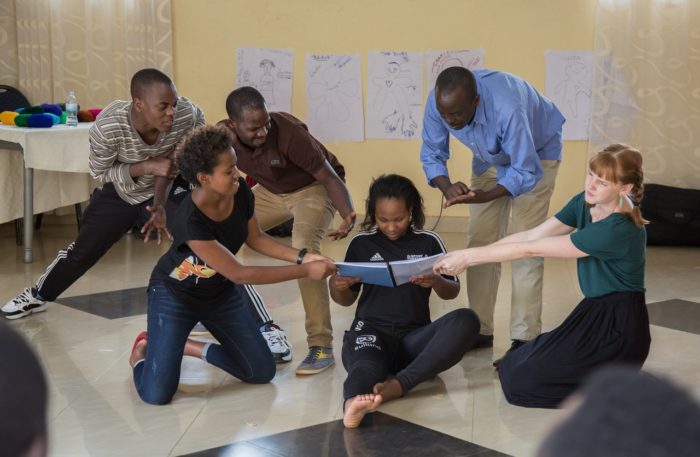
Facilitators at the training of trainers make a tableau, or frozen image, August 2018. Photo: Deus Kwizera
In 2018, MAP was launched in the Eastern Province of Rwanda. Initial activities included a curriculum workshop with cultural artists to inform the methodology, a training of trainers with educators to adapt the methodology to local and regional contexts, and a youth camp to train young people as facilitators working alongside the adult educators to develop drama clubs and to integrate the methodology into schools.
In Rwamagana, MAP worked with five schools, ten cultural organisations, twenty-five educators, and ten young people to design and deliver the MAP methodology. Following the training events, youth and adult trainers extended the training to an additional 62 educators and 526 young people by the December 2018.
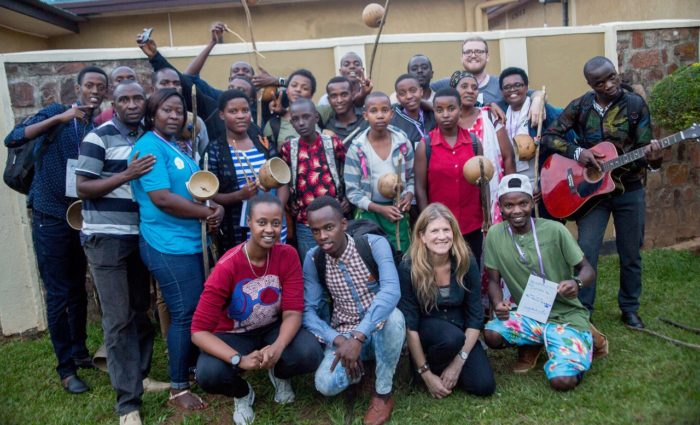
Teachers, cultural artists and young participants gather for a photo at the youth camp, December 2018. Photo: Deus Kwizera
What’s Next in 2019?
Countrywide Expansion
Thanks to AHRC follow on impact funding, MAP youth and adult trainers from Rwamagana district will train adult educators and young people in Gicumbi, Rubavu, Nyamasheke, Huye and Kicukiro using the same structure as the pilot phase.
Small Grants
In order to support their extraordinary success, MAP adult and youth trainers have been invited to apply for small grants that can help to deliver ongoing training; to initiate drama clubs; and to expand MAP to other schools, communities and districts in the Eastern Province.
Mobile Filmmaking
MAP adult and youth trainers will participate in a Mobile Filmmaking workshop conducted by Eric Kabera of Kwetu Film Institute in April 2018. Mobile phones will be given to each of the participants to document, edit and produce short films.
Partner Highlights: Sana Initiative
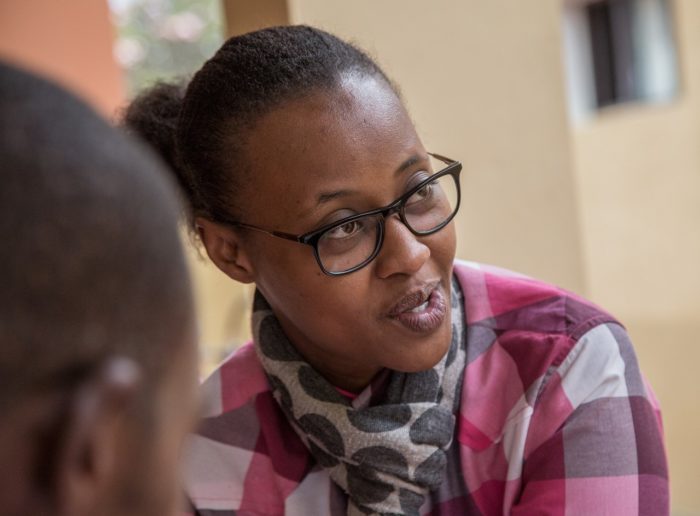
Laure Iyaga speaks to facilitators about sojourning, August 2018. Photo: Deus Kwizera
Thanks to Laure Iyaga, MAP is a peace building initiative in Rwanda that integrates mental health awareness and support for its participants.
In addition to offering workshops and counselling during MAP activities, Sana offers ongoing support to MAP youth and adult trainers.
Ms Iyaga stated: ‘The equality among trainers and trainees creates a safe space and is working to heal deep wounds from the lack of a support system experienced by many young people.’
Learn More about Sana Initiative and their work in a broader Rwandan context by following this link.
24 January Stakeholder Meeting
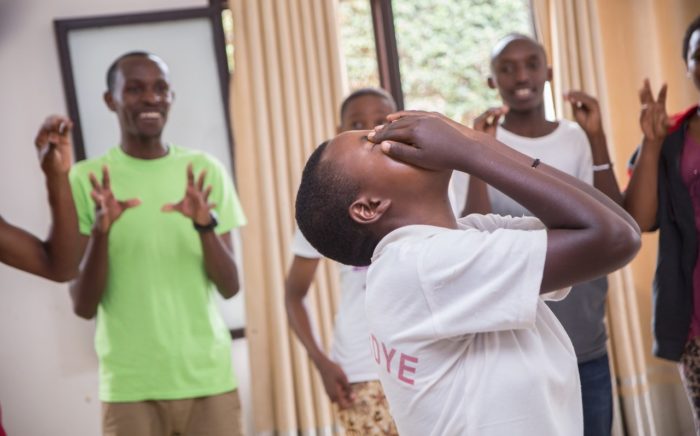
A young participant leads and activity during the youth camp, November: 2018. Photo Deus Kwizera
On 24 January 2019, the Institute for Research and Dialogue for Peace (IRDP) launched their role as co-investigator of Mobile Arts for Peace (MAP) at a stakeholder meeting in Kigali, Rwanda attended by the Rwanda Education Board (REB), Ministry of Education, Ministry of Sports and Culture, Ministry of Youth, Ministry of ICT and Innovation and numerous distinguished guests. Mrs. Joan Umurungi from REB served as the guest of honour. Mrs. Umurungi commented on the importance of arts for peacebuilding and educational processes. Additionally, REB representatives noted their endorsement of MAP as a key partner and how MAP aligns with the vision of the Ministry of Education concerning the development of the competence based curriculum. MAP enhances peace values, public speaking, inclusive education and develops a society that assists with healing.
MINISPOC noted the importance of MAP to develop the creative industries nationally. Ministry representatives noted that MAP is practical, grassroots based, and brings a sense of ‘life’ in terms of conflict prevention and the promotion of dialogue through an arts-based approach. Speakers included: Dr. Eric Ndushabandi from IRDP; Dr. Sylvestre Nzahabwanayo from the College of Education, University of Rwanda; Dr. Samuel Rushworth from Aegis Trust; Mrs. Amy Barnecutt from A Partner in Education; Mr. Jeymo Mutinda from Music Mind Consult; Mr. Victor Ntezirembo from IRDP, Ms. Laure Iyaga from Sana Initiative, Dr. Ananda Breed from the University of Lincoln and Kurtis Dennison, MAP Project Manager. Presentations and workshops were based on the use of arts with and for young people in peacebuilding initiatives.
The role of arts for peacebuilding initiatives has influenced major research and civil society organisations both nationally and internationally. Some of the benefits of arts-based approaches includes the opportunity to create innovative approaches for community dialogue alongside the development of skill building in the performing arts more generally.
Initial Research Findings from Dr. Sylvestre Nzahabwanayo
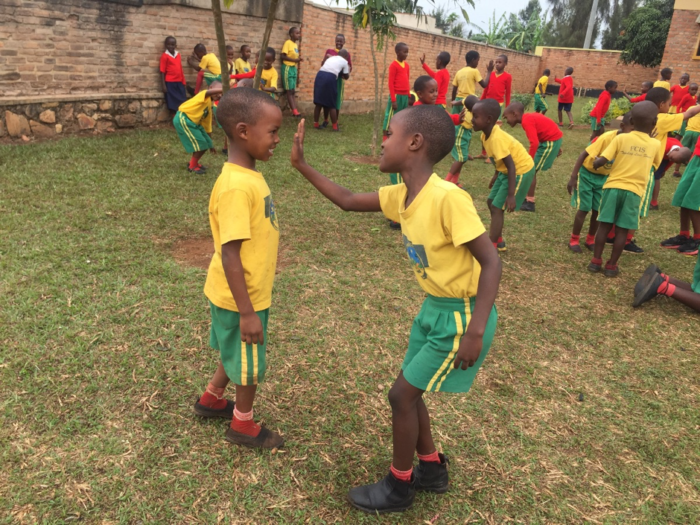
Young people participate in MAP activities at a Rwamagana Schoool, September 2018. Photo: Kurtis Dennison
Dr. Sylvestre Nzahabwanayo from the College of Education, University of Rwanda provided the following research findings based on interviews and focus groups with MAP youth and adult trainers, cultural artists, and stakeholders:
MAP keeps us awake in the classroom
Students reveal that by engaging in MAP activities amid a busy day with lessons, they are kept awake and do not feel sleepy. Given the introduction of the module system in advanced level in high schools (where a lesson can take up to 5 hours), it is important to keep students’ momentum.
MAP has enabled us to speak in public
The vast majority of students admit that before engaging with MAP they could not stand in front of their peers and make an argument. MAP has empowered them with public speaking skills. Students who were shy in the classroom confess that they can now raise questions to the teacher.
MAP has raised my marks
Preliminary findings of this study show that MAP has improved the academic performance of students. Some say that before engaging with MAP they used to be lazy in the classroom. But after meeting MAP, they learn enthusiastically; they try to link what they learn with their daily life and this contributes greatly to their academic achievement.
MAP has allowed me to engage with my parents
Students tell that before engaging with MAP they were fearing their parents and were only receiving instructions. After participant in MAP, they have acquired skills to engage in a dialogue with their parents on different issues and come to a consensus.
I am attentive to what happens in my society
The vast majority of students affirm that before engaging with MAP they were indifferent to fundamental problems of the Rwandan society. Students admit that after participating in MAP trainings, they are now awake to what happens around them.
After the training of trainers, we worked with our school children. They were motivated and developed skills. Among the teachers, we now have a drama team. We teachers are capable to train the children in drama. The impact of MAP in our schools is seen through what we are doing.
-Hassan Ngendahimana, Friends of the Children International School
